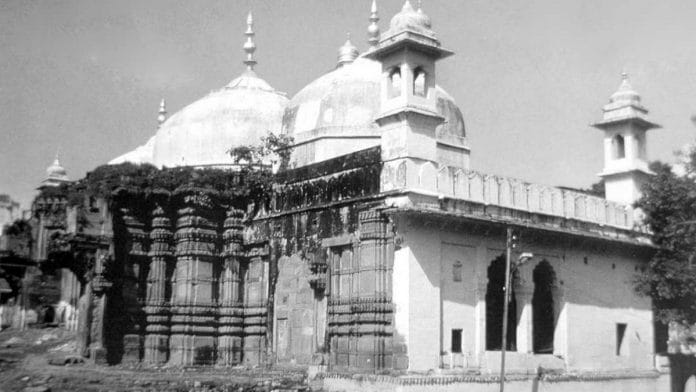New Delhi: The Allahabad High Court Thursday stayed a Varanasi court’s 8 April order directing the Archaeological Survey of India (ASI) to conduct a survey of the Gyanvapi mosque complex, adjacent to the Kashi Vishwanath temple.
Allahabad HC Justice Prakash Padia noted that the civil court had passed the order despite the high court reserving its judgment in petitions challenging the maintainability of the title dispute, and also staying the proceedings in the civil court earlier, in 1998.
The judge then observed: “In the opinion of the court, the court below should wait for the verdict in the petitions pending before this court and not proceed further in the matter till the time a judgment is delivered. The judicial courtesy and decorum warranted such discipline which was expected from the court below, but for unfathomable reasons, neither of the courses were taken.”
Justice Padia further said: “It is to be regretted that the court below departed from this traditional way in the present case and chose to examine the question himself. I have said so with the fond hope that judicial enthusiasm should not obliterate the profound responsibility that is expected from the court below.”
The matter will next be heard on 8 October, and till then, further proceedings in the original 1991 suit before the lower court will remain pending.
The 1991 suit
The original suit in this case was filed in 1991 by the devotees in the name of the deity ‘Swayambhu Lord Vishweshwar’, claiming that the Gyanvapi mosque was built at the site of a temple that was demolished in 1669 on the orders of Mughal emperor Aurangzeb. They, therefore, demanded that they should be allowed to “renovate and reconstruct their temple”.
While this suit was pending, the Gyanvapi mosque’s management committee, Anjuman Intezamia Masjid, filed an application in 1995, demanding rejection of the suit on the ground that it is barred by provisions of the Places of Worship (Special Provisions) Act, 1991.
According to this law, all places of worship shall be maintained as they existed on 15 August 1947, and no legal proceeding can be filed on the conversion of the religious character of any place of worship existing on that date.
This issue reached the Allahabad High Court, which stayed further proceedings in the lower court in August 1998. The matter remained pending for over 22 years, and then, on 15 March 2021, the Allahabad High Court reserved its judgment in this case.
Meanwhile, on 10 December 2019, a month after the Supreme Court verdict in the Ram Janmabhoomi-Babri Masjid case, the plaintiffs approached the lower court demanding that the ASI should conduct a survey of the disputed premises.
While the stay imposed by the Allahabad High Court remained in force, the plaintiffs cited a 2018 Supreme Court judgment which said that all orders staying proceedings of any matter before the courts shall be treated as having automatically expired after six months. Citing this order, the civil court restarted proceedings in the title dispute in 2020.
However, this move was again challenged in the Allahabad High Court, which reiterated its stay in March 2020.
Also read: Day or night, workers push hard to finish PM Modi’s pet Kashi Vishwanath Dham project
‘Court had knowledge of pending proceedings’
Civil Judge (Senior Division) Ashutosh Tiwari allowed the application for an ASI survey of the Gyanvapi complex in April this year, instructing the director-general of the ASI to constitute a five-member committee of eminent persons and experts well-versed with archaeology, with two of its members being preferably from the minority community.
According to the order, the main purpose of the survey was to “find out as to whether the religious structure standing at present at the disputed site is a superimposition, alteration or addition or there is structural overlapping of any kind, with or over, any other religious structure”.
Staying this civil court order, the high court noted Thursday that the “court below has full knowledge regarding the pending proceedings before this court”.
“In this view of the matter, the court below should not have proceeded and decided the application filed by the plaintiffs in the original suit for survey by Archaeological Survey of India,” the high court said.
(Edited by Paramita Ghosh)
Also read: Bollywood lyricist calls Mughal rulers ‘dacoits’, historians dismiss it as ‘jingoism’






